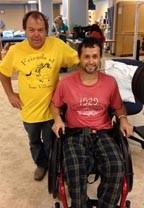
Maryland Horsemen’s Assistance Fund Caring for Those in Need
The backstretch of a racetrack is more than a place of employment, it’s a small community. A community of people living and working hard to care for horses who never take vacations and where a horse’s “sick day” means even more work for the horsemen. However, in Maryland the backstretch provides an even bigger community atmosphere with the aid of the Maryland Horseman’s Assistance Fund (MHAF). Since 1947, MHAF has provided services such as health programs, a prescription plan, counseling programs and financial assistance to horsemen in need.
Lead by Executive Director Bobby Lillis, MHAF’s most popular service areas are prescription plans where horsemen can receive financial help for prescription medications and a dental plan where needed dental care (i.e. a toothache, etc.) can be addressed with financial assistance from MHAF. The prescription plan is supplemented with a backstretch health program which provides a medical clinic twice a week at Maryland tracks during live racing. There, Dr. Harry Harris can see patients without insurance and write prescriptions and even order blood testing or x-rays through an agreement MHAF has with Quest Diagnostic.
One of the most popular health initiatives MHAF hosts is an annual health fair. “It’s usually the only time people get health addressed,” said Lillis about the fair. Lillis remarked that many of the horsemen will often care for their horses 10 times better than they do themselves, which is why the health fair is so important to catch conditions like high blood pressure and diabetes before the conditions develop serious issues. The MHAF has also helped many people sign up for the Affordable Care Act who may not have access to a computer.
Life on the backstretch can be dangerous and “in a matter of an hour, your whole life can change,” said Lillis in reference to the risks involved in working on a racetrack. Just last fall, exercise rider Jose Villegas took a spill in the morning while exercising a horse. The accident paralyzed Villegas. Through fundraising, MHAF raised $40,000 for Villegas and his family to help him through the mounting expenses after his accident.
In addition to Villegas’ case, the MHAF assists with other non-work related injuries not covered under workers’ compensation. Recently, MHAF contributed to the aid of a track security guard who had to have his leg amputated from diabetes complications and assisted a backstretch worker with his medical bills after a car accident on the icy roads this past winter. Although not as frequently utilized, MHAF also provides burial service for horsemen without next of kin or with kin unable to afford a burial service.
One of the most successful MHAF programs is a counseling service provided to backstretch workers. According to Lillis, after hitting rock bottom and given a final warning by his boss, a backstretch employee started attending MHAF sponsored counseling meetings to combat his alcoholism. Although the employee had struggled with alcoholism for some time, he completely turned his life around and now holds an excellent job.
TCA’s grant to MHAF assists the current area of greatest need. Funds are also collected from gate fees for Maryland starters and fines collected from the Maryland Racing Commission.
With the number of services MHAF provides, it’s difficult to determine what could be next for the organization serving over 300 backstretch workers annually. “We’d like to add more recreation,” Lillis said about the future for the program.

